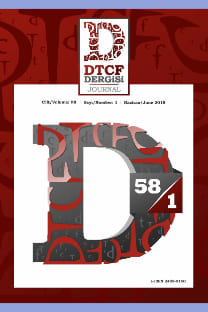CHALLENGING ANTHROPOCENTRISM: SAKI'S USE OF 1ANIMISM IN HIS “SREDNI VASHTAR
İNSAN-MERKEZCİLİĞE MEYDAN OKUMA: SAKI'NİN “SREDNI VASHTAR” ADLI ÖYKÜSÜNDE ANİMİZM KULLANIMI
___
“Animism.” Oxford English Dictionary. Ed. A.H. Murray et al. Vol 1. Oxford: Clarendon, 1978.Aristotle. Politics. Trans. H. Rackham. 4th ed. London: William Heinemann LTD, 1959.
Byrne, Sandie. “Saki (Hector Hugh Munro) (1870-1914).” The Facts on File Companion to the British Short Story. Ed. Andrew Maunder. New York: Infobase, 2007. 365-367.
Byrne, Sandie. “The Short Stories of Hector Hugh Munro (“Saki”).” A Companion to the British and Irish Short Story. Eds. Cherly Alexander Malcolm and David Malcolm. Oxford: Wiley- Blackwell, 2008. 157-164.
Byrne, Sandie. The Unbearable Saki: The Work of H.H. Munro. Oxford: Oxford UP, 2007.
Carey, John. “Introduction.” Saki. Short Stories and the Unbearable Bassington. Oxford and New York: Oxford UP, 1994. vii-xxiv.
Cavalieri, Paola. The Animal Question: Why Nonhuman Animals Deserve Human Rights. Trans. Catherine Woollard. Oxford: Oxford UP, 2001.
Cottingham, John. A Descartes Dictionary. Oxford: Blackwell, 1993.
Descartes, René. Discourse on Method and Meditations. Trans. Elizabeth S. Haldane and G.R.T. Ross. Mineola and New York: Dover, 2003.
Descartes, René. The Philosophical Writings of Descartes. Trans. John Cottingham et al. Cambridge: Cambridge UP, 1991.
Drake, Robert. “Saki: Some Problems and a Bibliography.” English Literature in Transition, 1880-1920 5.1 (1962): 6-26. Project Muse. Web. 19 Oct. 2012.
Fudge, Erica. Animal. London: Reaktion, 2002.
Gibson, Brian. “Beastly Humans: Ambivalence, Dependent Dissidence, and Metamorphosis in the Fiction of Saki.” Diss. The U of Alberta, 2006. Proquest. Web. 23 Oct. 2012.
Harvey, Graham. Animism: Respecting the the Living World. London: Hurst and Company, 2005.
Mattar, Sinéad Garrigan. “Yeats, Fairies, and the New Animism.” New Literary History 43.1 (Winter 2012): 137-157. Project Muse. Web. 14 Feb. 2014.
Munro, H[ector] H[ugh]. The Penguin Complete Saki. London: Penguin, 1976.
The New English Bible with the Apocrypha. Oxford: Oxford and Cambridge UP, 1970.
Philo, Chris and Chris Wilbert. “Animal Spaces, Beastly Places: An Introduction.” Animal Spaces, Beastly Places: New Geographies of Human-Animal Relations. London and New York: Routledge, 2000. 1-35.
Sharpe, Tom. “Introduction.” H.H. Munro. The Best of Saki. 4th ed. London: Pan, 1976. 7-14.
Spears, George James. “The Satiric Art of H.H. Munro (‘Saki’).” Diss. The U of Ottowa, 1953. Proquest. Web. 23 Oct. 2012.
“Toast.” Oxford English Dictionary. Ed. A.H. Murray et al. 11 Vols. Oxford: Clarendon, 1978.
Tylor, Edward B. Primitive Culture: Researches into the Development of Mythology, Philosophy, Religion, Art, and Custom. Vol 1. London: Routledge/ Thoemmes,1994.
Waugh, Auberon. “Introduction.” Saki (H.H. Munro). The Chronicles of Clovis. New York: Penguin, 1986. vii-xii.
White, Lynn. “The Historical Roots of Our Ecologic Crisis.” The Ecocriticism Reader: Landmarks in Literary Ecology. Eds. Cheryll Glotfelthy and Harold Fromm. Athens and London: The U of Georgia P, 1996. 3-14.
- ISSN: 0378-2905
- Yayın Aralığı: 2
- Başlangıç: 1942
- Yayıncı: Ankara Üniversitesi Dil ve Tarih-Coğrafya Fakültesi
Azime PEKŞEN YAKAR, Dilek DEMİRTEPE SAYGILI
WHEN MAGIC IS REPLACED WITH SCIENCE: SCIENCE 1POEMS OF DAVID MORLEY
'BİZ DE, KENDİ ÇAPIMIZDA AVRUPAYIZ': KÜRESELLEŞME IŞIĞINDA DAVID GREIG'İN AVRUPA ADLI OYUN
SERGEY DOVLATOV'UN ESERLERİNDE RETORİK FİGÜRLER
FOTOĞRAFLARDAN VE YÜZ ÜZERİNDEN ALINAN ANTROPOMETRİK ÖLÇÜLERDEN KİMLİK TESPİTİ VE CİNSİYET TAYİNİ
AIME CESAIRE'İN GÖZÜNDEN KONGO'NUN BAĞIMSIZLIK MÜCADELESİ VE PATRICE LUMUMBA: UNE SAISON AU CONGO
1913 TARİHLİ İDARE-İ HUSUSİYE-İ VİLAYAT TALİMATNAMESİNE GÖRE VİLAYET BÜTÇELERİNİN YASALAŞMASI
TANIMA BELLEĞİNDE MADDE VE BAĞLAM MODELLERİ HAKKINDA BİR KARŞILAŞTIRMA
ÜNİVERSİTE ÖĞRENCİLERİNDE DİJİTAL / E-KİTAP OKUMA KÜLTÜRÜ: SELÇUK ÜNİVERSİTESİ ÖRNEĞİ
